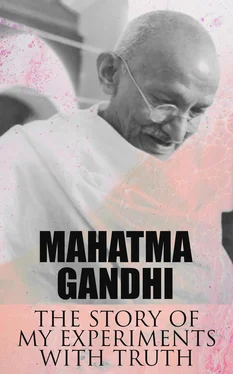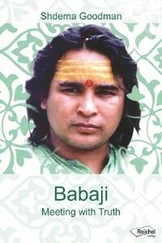I must confess that here I had to compromise the principle of giving no commission, which in Bombay I had so scrupulously observed. I was told that conditions in the two cases were different; that whilst in Bombay commissions had to be paid to touts, here they had to be paid to vakils who briefed you; and that here as in Bombay all barristers, without exception, paid a percentage of their fees as commission. The argument of my brother was, for me, unanswerable. ‘You see,’ said he, ‘that I am in partnership with another vakil. I shall always be inclined to make over to you all our cases with which you can possibly deal, and if you refuse to pay a commission to my partner, you are sure to embarrass me. As you and I have a joint establishment, your fee comes to our common purse, and I automatically get a share. But what about my partner? Supposing he gave the same case to some other barrister, he would certainly get his commission from him.’ I was taken in by this plea, and felt that, if I was to practise as a barrister, I could not press my principle regarding commissions in such cases. That is how I argued with myself, or to put it bluntly, how I deceived myself. Let me add, however, that I do not remember ever to have given a commission in respect of any other case.
Though I thus began to make both ends meet, I got the first shock of my life about this time. I had heard what a British officer was like, but up to now had never been face to face with one.
My brother had been secretary and adviser to the late Ranasaheb of Porbandar before he was installed on his gadi 14, and hanging over his head at this time was the charge of having given wrong advice when in that office. The matter had gone to the Political Agent who was prejudiced against my brother. Now I had known this officer when in England, and he may be said to have been fairly friendly to me. My brother thought that I should avail myself of the friendship and, putting in a good word on his behalf, try to disabuse the Political Agent of his prejudice. I did not at all like this idea. I should not, I thought, try to take advantage of a trifling acquaintance in England. If my brother was really at fault, what use was my recommendation? If he was innocent, he should submit a petition in the proper course and, confident of his innocence, face the result. My brother did not relish this advice. ‘You do not know Kathiawad,’ he said, ‘and you have yet to know the world. Only influence counts here. It is not proper for you, a brother, to shirk your duty, when you can clearly put in a good word about me to an officer you know.’
I could not refuse him, so I went to the officer much against my will. I knew I had no right to approach him and was fully conscious that I was compromising my self-respect. But I sought an appointment and got it. I reminded him of the old acquaintance, but I immediately saw that Kathiawad was different from England; that an officer on leave was not the same as an officer on duty. The Political Agent owned the acquaintance, but the reminder seemed to stiffen him. ‘Surely you have not come here to abuse that acquaintance, have you?’ appeared to be the meaning of that stiffness, and seemed to be written on his brow. Nevertheless I opened my case. The sahib was impatient. ‘Your brother is an intriguer. I want to hear nothing more from you. I have no time. If your brother has anything to say, let him apply through the proper channel.’ The answer was enough, was perhaps deserved. But selfishness is blind. I went on with my story. The sahib got up and said: ‘You must go now.’
‘But please hear me out,’ said I. That made him more angry. He called his peon and ordered him to show me the door. I was still hesitating when the peon came in, placed his hands on my shoulders and put me out of the room.
The sahib went away as also the peon, and I departed, fretting and fuming. I at once wrote out and sent over a note to this effect: ‘You have insulted me. You have assaulted me through your peon. If you make no amends, I shall have to proceed against you.’
Quick came the answer through his sowar:
‘You were rude to me. I asked you to go and you would not. I had no option but to order my peon to show you the door. Even after he asked you to leave the office, you did not do so. He therefore had to use just enough force to send you out. You are at liberty to proceed as you wish.’
With this answer in my pocket, I came home crest-fallen, and told my brother all that had happened. He was grieved, but was at a loss as to how to console me. He spoke to his vakil friends. For I did not know how to proceed against the sahib. Sir Pherozeshah Mehta happened to be in Rajkot at this time, having come down from Bombay for some case. But how could a junior barrister like me dare to see him? So I sent him the papers of my case, through the vakil who had engaged him, and begged for his advice. ‘Tell Gandhi,’ he said, ‘such things are the common experience of many vakils and barristers. He is still fresh from England, and hot-blooded. He does not know British officers. If he would earn something and have an easy time here, let him tear up the note and pocket the insult. He will gain nothing by proceeding against the sahib, and on the contrary will very likely ruin himself. Tell him he has yet to know life.’
The advice was as bitter as poison to me, but I had to swallow it. I pocketed the insult, but also profited by it. ‘Never again shall I place myself in such a false position, never again shall I try to exploit friendship in this way,’ said I to myself, and since then I have never been guilty of a breach of that determination. This shock changed the course of my life.
V PREPARING FOR SOUTH AFRICA
Table of Contents
I was no doubt at fault in having gone to that officer. But his impatience and overbearing anger were out of all proportion to my mistake. It did not warrant expulsion. I can scarcely have taken up more than five minutes of his time. But he simply could not endure my talking. He could have politely asked me to go, but power had intoxicated him to an inordinate extent. Later I came to know that patience was not one of the virtues of this officer. It was usual for him to insult his visitors. The slightest unpleasantness was sure to put the sahib out.
Now most of my work would naturally be in his court. It was beyond me to conciliate him. I had no desire to curry favour with him. Indeed, having once threatened to proceed against him, I did not like to remain silent.
Meanwhile I began to learn something of the petty politics of the country. Kathiawad, being a conglomeration of small states, naturally had its rich crop of politicals. Petty intrigues between states, and intrigues of officers for power were the order of the day. Princes were always at the mercy of others and ready to lend their ears to sycophants. Even the sahib’s peon had to be cajoled, and the sahib’s shirastedar was more than his master, as he was his eyes, his ears and his interpreter. The shirastedar’s will was law, and his income was always reputed to be more than the sahib’s. This may have been an exaggeration, but he certainly lived beyond his salary.
This atmosphere appeared to me to be poisonous, and how to remain unscathed was a perpetual problem for me.
I was thoroughly depressed and my brother clearly saw it. We both felt that, if I could secure some job, I should be free from this atmosphere of intrigue. But without intrigue a ministership or judgeship was out of the question. And the quarrel with the sahib stood in the way of my practice.
Porbandar was then under administration, and I had some work there in the shape of securing more powers for the prince. Also I had to see the Administrator in respect of the heavy vighoti (land rent) exacted from the Mers. This officer, though an Indian, was, I found, one better than the sahib in arrogance. He was able, but the ryots appeared to me to be none the better off for his ability. I succeeded in securing a few more powers for the Rana, but hardly any relief for the Mers. It struck me that their cause was not even carefully gone into.
Читать дальше












